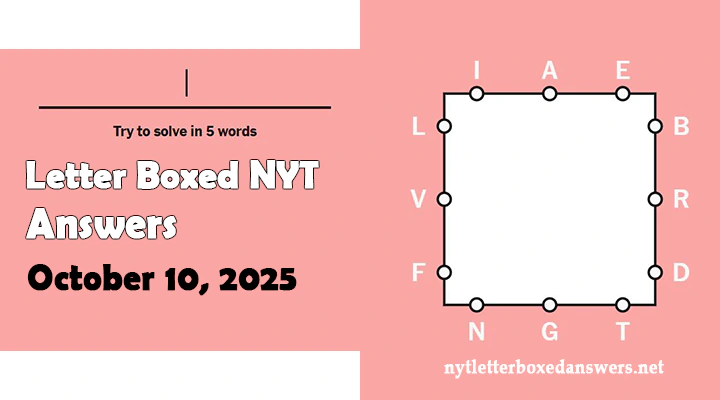NYT Letter Boxed quiz for Friday October 10, 2025 is released. We came up with Letter Boxed October 10 2025 Answers and Hints for you. With the help of these hints, you will be able to guess the words of letter boxed quiz without revealing the answers and get the solution.
| Three Words Solution | ||
|---|---|---|
| ABAFT | TABLED | DEGENERATIVE |
| Two Words Solution | ||
|---|---|---|
| INDEFATIGABLE | EVER | |
| FATIGABLE | ENERVATED | |
| Three Words Solution | ||
|---|---|---|
| ABAFT | TABLED | DEGENERATIVE |

Word 01:
(13 letters, starts with I, ends with E) Showing tireless persistence and energy.
Someone who never gives up, no matter how long it takes.
A synonym of “untiring” or “unflagging.”
Often describes determined workers or athletes.
Rooted in Latin, meaning “not able to be wearied.”
Used to praise endless enthusiasm or effort.
Antonym: “fatigued” or “weary.”
Common in heroic or motivational contexts.
Adjective for relentless perseverance.
Example: Her indefatigable spirit inspired the team.
Word 02:
(4 letters, starts with E, ends with R) At any time; always.
Often used in comparisons or emphasis.
Appears in idioms like “forever and ___.”
Opposite of “never.”
Used to indicate continuous action.
Common in poetry and song lyrics.
Can mean “at all” in older English.
Rhymes with “clever.”
Expresses permanence or timelessness.
Example: Have you ever seen such a sight?
Word 01:
(9 letters, starts with F, ends with E) Capable of being tired or exhausted.
Opposite of “indefatigable.”
Describes someone who can grow weary with effort.
Rarely used in modern English.
Derived from the Latin word for “weary.”
Can apply to physical or mental fatigue.
A formal or literary term.
Adjective describing limited endurance.
Used humorously as a contrast to tirelessness.
Example: Even the most energetic leaders are ultimately fatigable
Word 02:
(9 letters, starts with E, ends with D) Lacking energy or vitality.
Describes someone who feels drained or weakened.
Opposite of “invigorated.”
Can refer to physical or emotional exhaustion.
Derived from Latin for “to weaken sinews.”
Often used after illness or overexertion.
Synonyms: exhausted, devitalized.
Common in literary and psychological contexts.
Verb form: “to enervate.”
Example: The long heatwave left the crowd enervated.
Word 01:
(5 letters, starts with A, ends with T) Nautical term meaning “toward the stern.”
Opposite of “forward” on a ship.
Used in navigation and sailing directions.
Derived from Old English and Norse roots.
Refers to position behind something on a vessel.
Rare in modern speech outside nautical use.
Can appear in ship logs or maritime fiction.
Related to “aft” and “astern.”
Adverb of position.
Example: The lifeboats were stored abaft the mainmast.
Word 02:
(6 letters, starts with T, ends with D) Formally submitted or postponed for discussion.
Common in parliamentary or business meetings.
Can mean to present or to delay depending on context.
Used both in British and American English (with differing meanings).
Derived from the noun “table,” as in to lay before.
Verb for deferring a decision or raising an issue.
Often used in legislative procedures.
Related to agenda management.
Synonym (US): postponed; (UK): proposed.
Example: The motion was tabled for next week’s session.
Word 03:
(12 letters, starts with D, ends with E) Characterized by decline or deterioration.
Common in medical or biological descriptions.
Often refers to progressive diseases.
Opposite of “regenerative.”
Derived from Latin for “to decline in quality.”
Can also describe moral or cultural decay.
Used metaphorically beyond medicine.
Adjective for processes that worsen over time.
Frequently paired with “disease” or “condition.”
Example: Arthritis is a degenerative joint disorder.

Chris Brown is a passionate word game love and problem solving expert. With over 15 years of experience in solving puzzle challenges, he provides daily NYT Letter Boxed answers, tips and strategies to help other players so that they can improve their solving skills. Whether you are stuck on a tricky puzzle or looking for new techniques, Chris is here to guide you with his expert solutions.